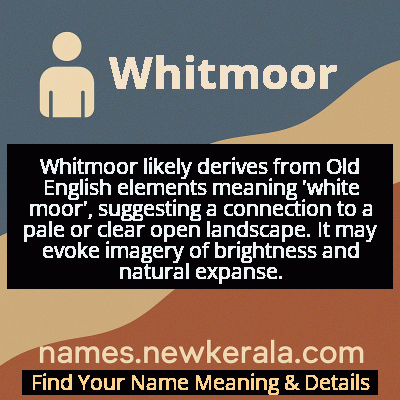Whitmoor Name Meaning & Details
Origin, Popularity, Numerology Analysis & Name Meaning of Whitmoor
Discover the origin, meaning, and cultural significance of the name WHITMOOR. Delve into its historical roots and explore the lasting impact it has had on communities and traditions.
Name
Whitmoor
Gender
Male
Origin
Christian
Lucky Number
4
Meaning of the Name - Whitmoor
Whitmoor likely derives from Old English elements meaning 'white moor', suggesting a connection to a pale or clear open landscape. It may evoke imagery of brightness and natural expanse.
Whitmoor - Complete Numerology Analysis
Your Numerology Number
Based on Pythagorean Numerology System
Ruling Planet
Uranus (Rahu)
Positive Nature
Strong sense of order, loyal, practical, and disciplined.
Negative Traits
Stubborn, overly serious, rigid, and prone to feeling restricted.
Lucky Colours
Blue, gray.
Lucky Days
Saturday.
Lucky Stones
Blue sapphire.
Harmony Numbers
1, 7, 8.
Best Suited Professions
Managers, engineers, accountants, organizers.
What People Like About You
Dependability, discipline, practicality.
Famous People Named Whitmoor
John Whitmoor
Land Surveyor
Commissioned to map the Yorkshire Dales and establish boundary markers for moorland territories
Thomas Whitmoor
Botanist
Documented rare moorland flora and published 'Flora of the Northern Moors' in 1842
William Whitmoor
Textile Merchant
Founded Whitmoor Mills which specialized in wool from moorland sheep breeds
Arthur Whitmoor
Military Officer
Led the Yorkshire Regiment in key battles and received the Distinguished Service Order
Name Variations & International Equivalents
Click on blue names to explore their detailed meanings. Gray names with will be available soon.
Cultural & Historical Significance
As Christianity spread through England, many families with nature-based surnames like Whitmoor adopted Christian names while retaining their occupational or locational surnames, creating a blend of pagan landscape reverence and Christian tradition that characterized medieval English naming practices. This dual heritage makes Whitmoor culturally significant as it represents the intersection of pre-Christian landscape worship and Christian naming conventions. The name's persistence through centuries demonstrates how geographical features continued to shape family identities even as religious influences transformed naming patterns. In Victorian England, the romanticization of moorland landscapes in literature further cemented the cultural appeal of names like Whitmoor, associating them with both natural beauty and emotional depth.
Extended Personality Analysis
Individuals named Whitmoor are often perceived as possessing a strong connection to nature and tradition, reflecting the name's geographical origins. They typically exhibit qualities of resilience and practicality, much like the moorland environment that inspired their name—able to withstand challenging conditions while maintaining their essential character. Whitmoors are frequently described as grounded, dependable individuals with a quiet strength that doesn't need constant validation. Their personality often combines introspection with practical action, making them both thoughtful and effective in their endeavors.
The moorland symbolism suggests someone comfortable with solitude but equally capable of deep, lasting connections with those they trust. Many Whitmoors display a blend of traditional values and independent thinking, honoring heritage while charting their own course. They tend to be observant and patient, with an appreciation for subtle beauty and understated elegance rather than flashy displays. This combination of steadfastness and sensitivity makes them particularly effective in roles requiring both emotional intelligence and practical problem-solving skills. Their connection to the 'white' aspect of their name often manifests as clarity of purpose and moral integrity in their personal and professional relationships, while the 'moor' element contributes their characteristic resilience and connection to natural cycles and traditions.
Modern Usage & Popularity
In contemporary times, Whitmoor remains a relatively rare but distinguished choice, primarily used as a surname that occasionally transitions into first name usage, particularly in English-speaking countries with strong British heritage connections. The name has seen a slight resurgence in recent years as part of the trend toward unique, nature-inspired names with historical depth. While it doesn't appear on mainstream baby name popularity charts, it maintains a steady presence in genealogical records and among families with specific regional ties to northern England. Modern Whitmoors can be found in various professions, though there's a noticeable concentration in fields related to environmental science, education, and heritage preservation. The name's usage patterns reflect a broader cultural appreciation for names that connect individuals to specific landscapes and historical traditions, making it particularly appealing to parents seeking names with both character and meaning beyond current naming trends. Its rarity ensures that those bearing the name maintain a sense of individuality while its historical roots provide a foundation of tradition and continuity.
Symbolic & Spiritual Meanings
The name Whitmoor carries rich symbolic meanings derived from its component parts: 'white' representing purity, clarity, and illumination, and 'moor' symbolizing wild natural beauty, resilience, and the boundary between civilization and wilderness. Together, these elements create a powerful metaphor for someone who maintains moral clarity and purity of purpose even in challenging or untamed circumstances. The white moor suggests a landscape that is both beautiful and formidable—a place where mist and light interact to create ethereal beauty while concealing practical dangers. Symbolically, this translates to individuals who combine visionary thinking with practical resilience. The moor aspect connects to themes of journey and transformation, as moors often represent transitional spaces in literature and folklore. Meanwhile, the white element introduces concepts of enlightenment, peace, and spiritual clarity. This combination makes Whitmoor symbolically representative of balanced character—someone who navigates life's wilderness with wisdom and emerges with integrity intact, much like the enduring moorlands that maintain their essential character through changing seasons and conditions.

